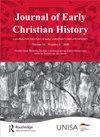Church and State in the Dispute over the Vicariate of Thessaloniki during the Pontificate of Boniface I
IF 0.1
0 RELIGION
引用次数: 0
Abstract
Abstract Following the appointment of Perigenes as bishop of Corinth in 419, some Illyrian bishops, upset that this violated the Nicene canon against the translation of bishops and that Boniface I, bishop of Rome from 418 to 422, had supported Perigenes’s election, secured a law from the eastern emperor, Theodosius II, that judicial appeals were to be heard at Constantinople (Cod. theod. 16.2.45). The innovation that Theodosius condemned was undoubtedly the practice of Illyrian bishops appealing through the bishop of Thessaloniki to Rome, a system that had flourished under several of Boniface’s predecessors, as documented in the letters of the Collectio Thessalonicensis. Boniface’s response was to enlist the support of Honorius, the western emperor, to appeal to his imperial nephew to reverse this decision as itself being an innovation (Boniface I, Ep. 10). Theodosius agreed (Boniface I, Ep. 11). This article examines the letters concerned in the light of the history of the vicariate of Thessaloniki and Boniface’s own relationship with imperial authority, which is demonstrated in the ultimately definitive involvement of Ravenna in settling the electoral controversy that surrounded Boniface’s own election in Rome. It argues that the whole Perigenes affair was one of the first examples of what has come to be called papal primacy, in that it was an exercise of ecclesiastical authority over an area that no longer belonged to his supervision, that Honorius complied with Roman episcopal wishes, and that Roman success was dependent upon the personal relationship between imperial uncle and nephew.教宗博尼法斯一世在位期间塞萨洛尼基代牧权之争中的教会与国家
摘要在419年佩里根尼被任命为科林斯主教后,一些伊利里亚主教感到不安,认为这违反了尼西亚反对主教翻译的教规,以及418年至422年担任罗马主教的博尼法斯一世支持佩里根尼斯的选举,狄奥多西谴责的创新无疑是伊利里亚主教通过塞萨洛尼基主教向罗马上诉的做法,这一制度在博尼法斯的几位前任时期蓬勃发展,正如塞萨洛尼卡收藏馆的信件所记录的那样。博尼法斯的回应是争取西方皇帝奥诺里乌斯的支持,呼吁他的侄子推翻这一决定,因为这本身就是一种创新(博尼法斯一世,Ep.10)。狄奥多西同意了(伯尼法斯一世,Ep.11)。本文根据塞萨洛尼基教区的历史以及博尼法斯自己与帝国权威的关系来研究相关信件,拉文纳最终参与解决了围绕博尼法斯斯自己在罗马选举的选举争议,这一点得到了证明。它认为,整个Perigenes事件是被称为教皇至上的最早例子之一,因为这是对一个不再属于他监督的地区行使教会权力,Honorius遵守了罗马主教的意愿,罗马的成功取决于帝国叔叔和侄子之间的个人关系。
本文章由计算机程序翻译,如有差异,请以英文原文为准。
求助全文
约1分钟内获得全文
求助全文

 求助内容:
求助内容: 应助结果提醒方式:
应助结果提醒方式:


